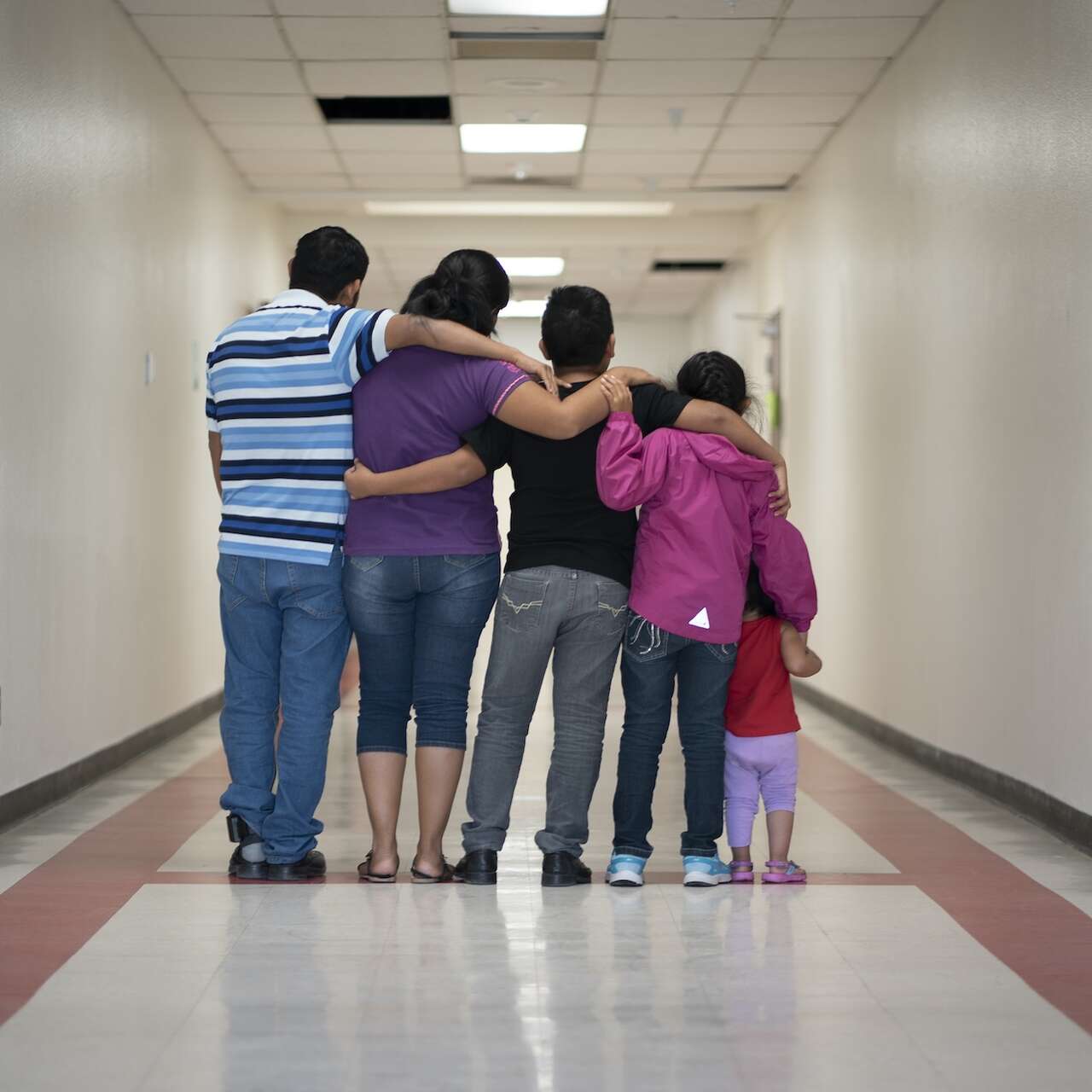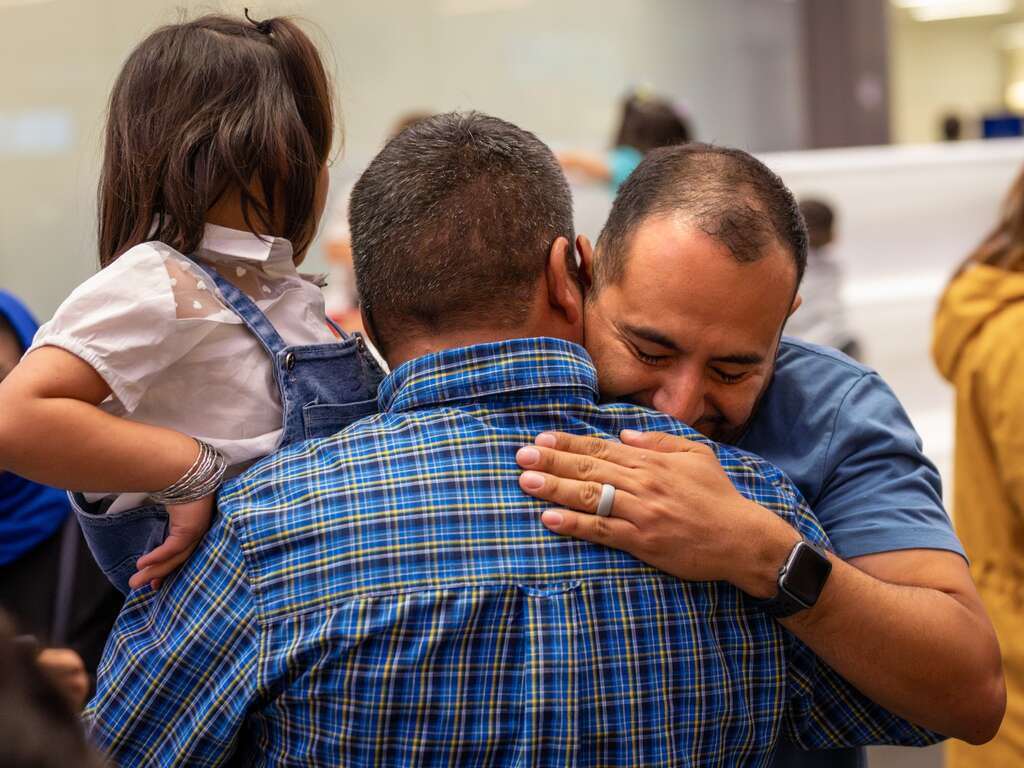
In this article:
- Do non-citizens have the right to due process?
- What is the Alien Enemies Act?
- Ways to advocate for due process rights of non-citizens
Due process is a fundamental right guaranteed by the U.S. Constitution. It protects people against arbitrary government decisions and ensures fairness in legal matters. Both citizens and non-citizens in the U.S. have the right to due process - a chance to defend their rights and to have a fair hearing.
Now, this principle faces a critical test. On April 7, 2025, the Supreme Court deliberated on whether non-citizens have the right to any form of legal process before being removed to foreign countries. Although the justices differed on the specifics of the process, they unanimously reaffirmed that the fundamental right to due process extends to everyone in America, regardless of their legal status.
This case comes amid policy changes and executive actions by the Trump administration resulting in the rapid expulsion of non-citizens, including asylum seekers, often without traditional legal hearings—raising profound questions about the boundaries of constitutional protections in immigration enforcement.
Do non-citizens have the right to due process?
Yes. Under the U.S. Constitution and laws, due process requires just and fair treatment of everyone, regardless of background or immigration status, if their life, freedom, or property is at risk. This includes having the opportunity to defend their rights in court.
But current policies that speed up deportations and limit access to lawyers have made it harder for non-citizens to get a fair chance. Furthermore, some policies are denying non-citizens any process at all before they are expelled. Due process is fundamental to ensuring credible and fair immigration and asylum systems.
What is habeas corpus?
A vital part of due process is habeas corpus. This protection, which predates the U.S. Constitution, allows individuals to challenge their detention by the government, ensuring that imprisonment is not arbitrary or unlawful. For immigrants, habeas corpus serves as a crucial safeguard, enabling them to contest their detention to ensure that proper legal procedures are followed. It is a fundamental check on government power and a key element in upholding justice. The Supreme Court has reaffirmed twice this year that non-citizens have a fundamental right to challenge their detention and removal through habeas corpus.
Why is a fair hearing important?
Having a chance to go before a judge is an essential part of due process. Hearings allow individuals and the government to present evidence and for the judge to make a decision based on the facts and the law. Individuals get to explain their situation and appeal mistaken decisions, protecting their rights. Fair hearings can lead to better decisions so that the public has confidence in the integrity of the legal system.
Non-citizens facing deportation have a right to due process, which usually includes a hearing before a judge. But current policies are making it even more difficult for non-citizens to get a fair hearing - rushing decisions, limiting the authority of immigration judges, and trying to remove people from the U.S. through rapid deportations that deny them the opportunity to present their case to a judge.
A former immigration judge previously described immigration court hearings as “death penalty cases in a traffic court setting” because of the high stakes outcomes in a system that has limited protections. Now, fair hearings are becoming even harder to come by.
Why does legal representation matter?
The right to speak with a lawyer and to have your attorney represent you in court is a key part of due process. However, in immigration cases, unlike in criminal cases, lawyers are not provided by the government.
Immigration law is very complex, and some immigrants don’t speak English fluently. Having a lawyer who understands the complexities of the law and the immigration process—and who can present the client’s situation to the judge—is critical. Studies show that people with lawyers are five times more likely to receive the immigration legal status they are entitled to under the law compared with those without legal representation.
Why are children especially in need?
Children who arrived in the U.S. without their parents need lawyers to protect their rights and ensure they are not sent back to abuse, trafficking or other danger. Without an attorney, children—including infants and toddlers—have to face the complicated immigration process alone, with little chance to defend their rights or avoid deportation.
For more than 20 years, unaccompanied children have received legal aid through a program funded by the federal government, which has enabled organizations like the IRC to represent unaccompanied children in immigration court. Although a federal court temporarily blocked the Trump administration from terminating this support, the U.S. government has now decided to fund the program in 3-month increments—leaving organizations like the IRC without the adequate stability needed to provide legal representation for unaccompanied children. The Trump administration could revoke this critical resource at a moment’s notice.
In August, 2025, the U.S. government committed a flagrant violation of due process protections for unaccompanied children by attempting to remove more than 100 Guatemalan children in the middle of the night—even those with active immigration cases. The IRC calls on the Trump administration to immediately halt all actions that violate due process and legal protections for unaccompanied children.

Arresting asylum seekers at immigration courthouses
As part of the Trump administration’s efforts to increase the number of deportations, there are now various reports of asylum seekers being arrested by Immigration and Customs Enforcement (ICE) officers at immigration courts during routine immigration check-ins.
Placing those seeking refuge in immigration detention makes it incredibly difficult for people to have a fair chance to present their case. Those held in detention often struggle to find lawyers, which makes it more challenging for them to be able to gather the evidence and find the witnesses they need to prove their cases on their own.
In some cases, the government is even seeking to terminate asylum seekers’ immigration court hearings and to put them into a fast-track expedited deportation process that further limits their due process rights, including eliminating the right to appeal to a federal judge.
The vast majority of asylum seekers attend their immigration hearings, but this type of immigration enforcement tactic at courthouses only create further fear, chaos and disorder, which could dissuade some people from showing up to their proceedings.
Members of Congress, including Republican representatives Mario Diaz-Balart and María Salazar, have expressed concerns that people who fear persecution in their home countries and who are complying with the steps of the asylum process are being needlessly arrested at immigration courts.
Ileana Garcia, a Republican state senator who worked in the Department of Homeland Security during the first Trump Administration, has criticized current immigration enforcement actions as “arbitrary measures to hunt down people who are complying with their immigration hearings – in many cases, with credible fear of persecution claims” and that “this undermines the sense of fairness and justice that the American people value.”
The risks of third-country removals and expulsions
The practice of removing and expelling non-citizens to "third countries"—nations that are neither their country of origin nor the United States—presents another threat to due process rights when people are not provided proper notice or an opportunity to express fears of persecution, effectively bypassing crucial legal protections.
A landmark case, D.V.D. v. Noem, now challenges this troubling practice. On April 18, 2025, a federal judge ordered the Department of Homeland Security (DHS) to stop sending non-citizens to third countries without providing them with written notice and an opportunity to challenge these removals. However, on June 23, 2025, the Supreme Court put that order on hold with an unsigned, two-sentence opinion. It is currently unclear what due process rights non-citizens with a final deportation order have before they are removed to third countries.
Third-country removals and expulsions manifest in various forms, each with significant due process implications. For instance, in February 2025, hundreds of families and individuals, including many people who were attempting to seek asylum at the southern US border, were sent by the US government to Costa Rica and Panama without an opportunity to apply for protection. In other cases, the government is seeking to deport people who have been through US immigration procedures and received an official removal order by sending them to a country that is not their home country. The US government dispatched a group of deportees to South Sudan—a country facing a severe humanitarian crisis that has left 72% of the population in need of aid. Immigrants from several Central Asian countries have also been deported to Uzbekistan, and the US is reportedly considering expanding third-country removals to Kosovo, Eswatini, Rwanda, Libya and several other countries.
US and international law prohibit sending anyone to a country where they will likely face torture or persecution. All people, regardless of where they’re from, must be treated with dignity and humanity. At a bare minimum, people should be provided adequate notice and an opportunity to challenge the removals before they are sent to a third country.
Due process and refoulement risks
Sending people to a country they’re not told they’re being sent to and without an opportunity to explain what danger they might face there fundamentally undermines essential due process safeguards and, in some cases, the right to seek asylum. These removals and expulsions can expose people to immediate harm in that third-country, including being held in immigration detention centers or prisons. It even places some of them at risk of being sent back to the home country they originally fled if such a third-country lacks fair and accessible asylum procedures, known as chain refoulement. For example, it has already been reported in at least one case, a Guatemalan man was “mistakenly” deported to Mexico and then returned to Guatemala, when a judge had already found the man risked persecution or torture if returned.
In a critical development, on May 7, 2025, following reports of a planned third-country removal flight to North Africa, litigators filed an emergency motion to prevent the removal of migrants to Libya without prior notice or a chance to explain their fear of being sent there. The court ruled that proceeding with the flight would violate existing orders, leading to its immediate cancellation—highlighting the vital role of judicial review in protecting due process rights. The court also ruled that the deportation of third country nationals to South Sudan without adequate notice or an opportunity to request protection violated the court’s earlier order. Although litigation is ongoing, the Supreme Court paused the nationwide order that prevented the U.S. from sending people to third countries without notice or an opportunity to explain why they fear being sent to a specific country. This decision appears to clear the way for more third-country removals while the case moves forward.
The Alien Enemies Act: A threat to due process
On March 15, 2025, President Trump declared that the U.S. was under invasion by a Venezuelan gang, Tren de Aragua, and invoked the centuries-old Alien Enemies Act (AEA). Part of the Alien and Sedition Acts of 1798, the AEA gives the U.S. government authority during wars to arrest and expel non-citizens from enemy countries. It has only been used three times in U.S. history, most infamously during World War II as part of the internment of Japanese Americans, which President Ronald Reagan later described as a “grave wrong” and an action “taken without trial, without jury” that was “based solely on race.”
Under President Trump’s current order, Venezuelans as young as 14 (with the exception of U.S. citizens and green card holders) can be expelled from the country without any hearing if they are merely accused of being members of the Tren de Aragua gang. Several lower courts as well as the Supreme Court have paused the administration from removing people under the AEA, but litigation remains ongoing.
Forcibly transporting Venezuelans to a prison outside the U.S. without immigration hearings or any other legal process is a profound break from the Constitution and the American tradition of due process.

How are other recent policies impacting due process?
If due process protections for non-citizens continue to be weakened, countless vulnerable people will be at risk of unjust treatment, including many of the individuals and families supported by the IRC:
- The recent expansion of the fast track expedited removal process will allow immigration officers to rapidly deport people without a full hearing, including Afghans, Cubans, Haitians, Nicaraguans, Ukrainians and Venezuelans who entered the U.S. with humanitarian parole protection. Under new immigration guidance, officers can terminate parole and initiate expedited removal, which includes a very limited review by an immigration judge.
- A March 2025 executive order claims that the immigration system is rife with “meritless claims” and “replete with examples of unscrupulous behavior by attorneys and law firms.” Threatening the use of professional and legal sanctions against attorneys who are legally and vigorously defending their clients could have a chilling effect on legal representation, further eroding due process guarantees for non-citizens who need lawyers.
- By reducing or eliminating due process protections, the administration is setting itself up to make more mistakes in its deportation efforts. Already, immigration authorities have acknowledged mistakenly sending a Salvadoran father of a disabled U.S. citizen child to El Savador, where he was held in a notorious prison, despite an immigration judge having previously granted him protection from being returned to El Salvador. Errors like this can have life or death consequences, and are the inevitable result of prioritizing speed over fair process.
Protecting due process for non-citizens
The International Rescue Committee (IRC) and other groups work to uphold due process for non-citizens by providing legal services, challenging harmful policies, and educating the public. IRC’s programs across 24 U.S. communities offer:
- Comprehensive legal representation for refugees and other groups seeking protection, including family reunification and naturalization assistance.
- Legal screenings to help people understand their options for securing lawful status and avoid exploitation.
- Know Your Rights clinics that impart crucial legal knowledge.
- Fee waiver assistance, saving clients an estimated $1.5 million annually in immigration application costs.
- Up-to-date information through Signpost, the IRC’s award-winning platform combating misinformation on immigration policies and connections to critical services.
How can I help?
- Urge policy reforms to strengthen due process protections, including legislation that guarantees legal representation for unaccompanied children in immigration proceedings through The Fair Day in Court for Kids Act of 2025 and expanding access to legal representation for individuals facing deportation through the SHIELD Act.
- Raise public awareness to promote fair treatment of all non-citizens in the U.S. and prevent the erosion of their fundamental legal rights under the Constitution.
Ensuring due process is not just a legal obligation—it is a safeguard against discrimination and injustice. Policymakers and advocates must work together to uphold these protections and prevent policies that threaten the basic rights of non-citizens in the U.S.




